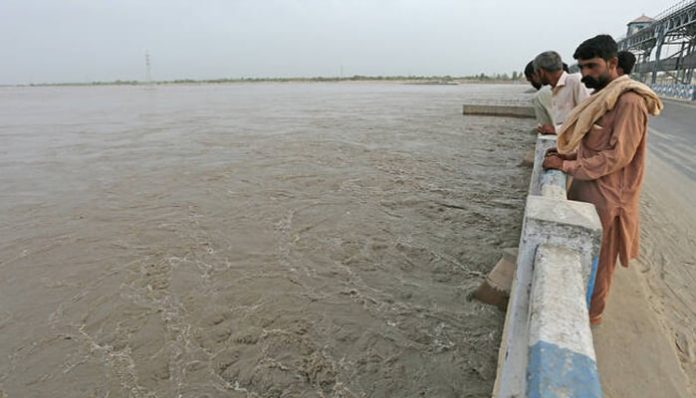ISLAMABAD: India on Monday made a second contact with Pakistan in a day to warn Islamabad about a potential flood in the Sutlej River, after issuing a previous warning about the Tawi River at Jammu, diplomatic sources told media.
The Indian High Commission in Islamabad reached out to the Ministry of Foreign Affairs to convey details regarding possible flood conditions in the Sutlej River, the sources said.
They added that India has shared such data with Pakistan during flood situations in the past.
Separately, the Foreign Office said that India — before the latest contact — communicated flood warnings through diplomatic channels, rather than through the bilateral commission as required under the Indus Waters Treaty (IWT), Radio Pakistan reported.
The FO reaffirmed that India is obligated to fully comply with all provisions of the treaty.
It said India’s unilateral declaration to hold the IWT in abeyance constitutes a serious violation of international law and could have significant negative consequences for peace and stability in South Asia.
It is noteworthy to mention here that India reached out to Pakistan for the first time hours earlier after the May military standoff to share details on a potential major flood in the Tawi River at Jammu.
The Indian High Commission in Islamabad conveyed the alert, with the communication made on the morning of Sunday, August 24, they added.
Following the alert, Pakistani authorities issued warnings based on the information provided by India, the sources confirmed.
In the wake of the killing of 26 people in the Pahalgam area of the Indian Illegally Occupied Jammu and Kashmir (IIOJK) in April, India held the IWT with Pakistan in abeyance.
New Delhi accuses Islamabad of orchestrating the deadly militant attack, an allegation that Pakistan denies.
Based on these groundless allegations, India waged a war against Pakistan in May, resulting in the heaviest military engagement in decades, before a ceasefire was brokered by the US.
The water treaty had survived three wars and other conflicts between the two rivals, while withstanding many twists and turns in diplomatic ties.
Reuters reported on May 16 that Delhi is considering projects that would likely reduce the flow of water into Pakistan from rivers allocated to that country.
India has also said that it will “keep the treaty in abeyance until Pakistan credibly and irrevocably abjures its support for cross-border terrorism.”
In contrast, Islamabad says “any attempt to stop or divert the flow of water belonging to Pakistan” will be an “act of war”.
What is Indus Waters Treaty?
The nuclear-armed neighbours disagree over the use of the water from rivers that flow downstream from India into the Indus River basin in Pakistan.
The use of the water is governed by the IWT, which was mediated by the World Bank and signed by the neighbours in September 1960.
The agreement split the Indus and its tributaries between the two countries and regulated water sharing. India was granted the use of water from three eastern rivers — Sutlej, Beas and Ravi — while Pakistan was granted most of the three western rivers — Indus, Jhelum and Chenab.
There is no provision in the treaty for either country to unilaterally suspend or terminate the pact, which has clear dispute resolution systems. –Agencies



